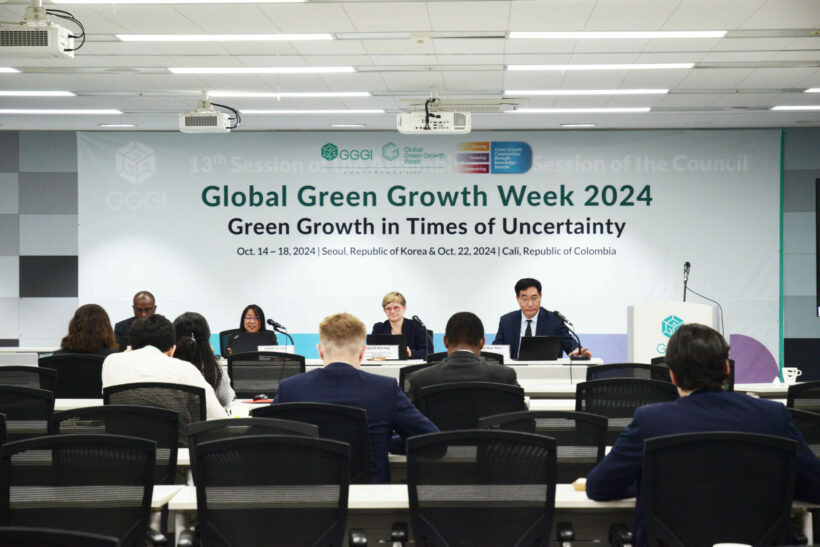On October 14, 2024, the annual Global Green Growth Week 2024 started its 8th hybrid conference in
Seoul City, South Korea, bringing together policymakers, investors, innovators, thought leaders, and
delivery agents from the public and private sectors to offer insights and learnings about solutions,
innovations that can achieve the needed green growth transformation, especially in times of uncertainty.
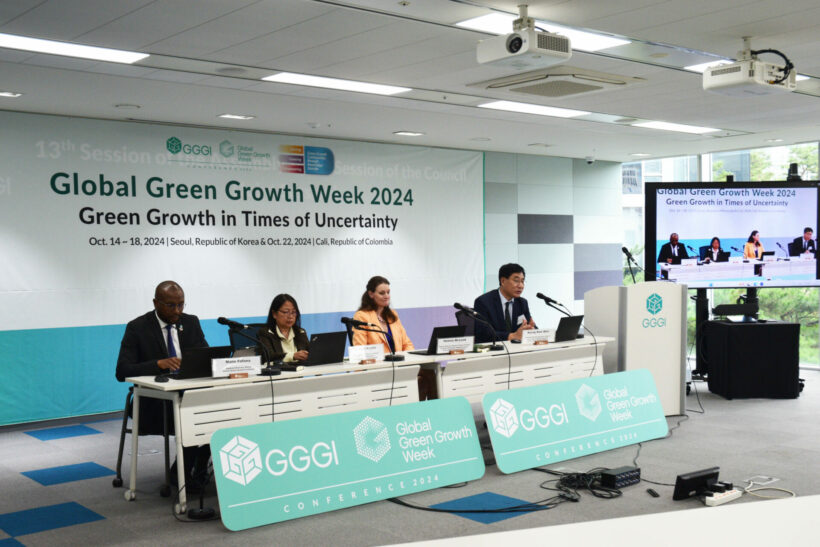
It is hosted by the Global Green Growth Institute (GGGI) based in Seoul- a treaty-based international,
inter-governmental organization- with 48 members and over 26 countries and 1 regional integration
organizations in the process of accession – dedicated to supporting and promoting strong, inclusive, and
sustainable economic growth in developing countries and emerging economies. With operations in over
50 countries, GGGI serves the role of an enabler and facilitator of members’ transition into a low-carbon
green economy, providing policy advice and technical support in the development of green growth
plans, policies and regulations, mobilization of green investments, implementation of green growth
projects, and development of local capacities and knowledge sharing.
According to the organizers, Global Green Growth Week 2024, GGGI’s premier knowledge-sharing
conference, is set to be held for the eighth time. This year, the conference theme is “Green Growth In
Times of Uncertainty”. The Opening Session serves as a platform for GGGI’s Director General and the
GGGI Team to share insights, reflect on past achievements and elucidate their role in advancing green
growth transitions. This session sets the tone for a week of knowledge exchange and collaboration
aimed at propelling the world towards a greener, more sustainable future.
In his video message on GGGWeek2024, the President of the Assembly and Chair of the Council of
the Institute, HE Ban Ki-moon, who served as the eighth secretary-general of the United Nations
between 2007 and 2016, said that our world today is surrounded by uncertainty. In times like this, we
must come together, navigate the complexities, and harness the opportunities before us to drive our
green growth agenda. The urgency is undeniable. We must act swiftly with a clear vision to achieve green growth and sustainable development for all.
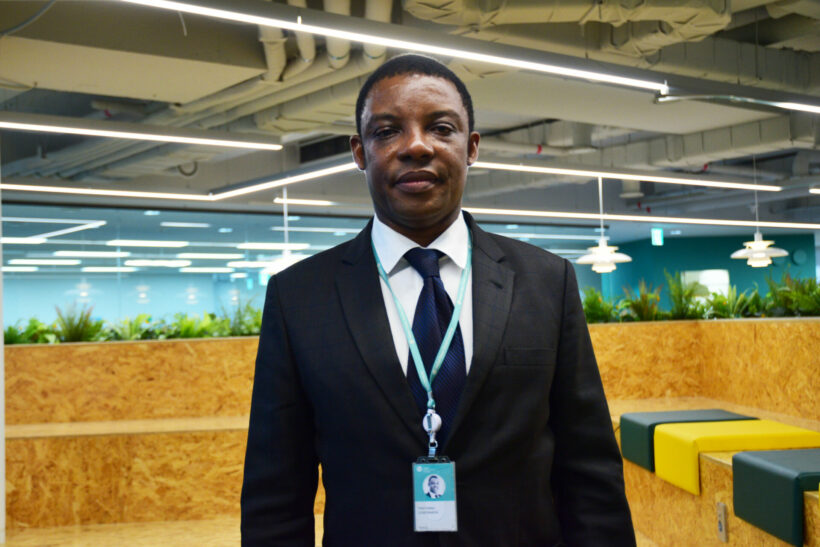 Okechukwu Daniel Ogbonnaya, GGGI’s Country Representative in Ethiopia.
Okechukwu Daniel Ogbonnaya, GGGI’s Country Representative in Ethiopia.
One of the conference speakers was Okechukwu Daniel Ogbonnaya, GGGI’s Country Representative in Ethiopia. Before he joined the Ethiopian office as a representative, he worked in South Korea and studied at Yonsei and Korea University. He majored in international development cooperation and did his research on climate change adaptation. He also holds an Executive Certificate in Economic Development from the John F. Kennedy School of Government at Harvard University.
He told Pressenza press that it’s already a concluded fact that if the world does not move in a green
growth pathway, then we will be negatively impacted. Already, we are seeing the impacts of climate
change, and there is no doubt an alternative growth model needs to be put in place.
“In Ethiopia, we have our office embedded within the government. We work with different government
institutions. We support the government in moving its green growth pathway forward. Ethiopia has
been a foundational Member State of GGGI from the beginning. GGGI was instrumental in the
development of the Climate Resilient Green Economy (CRGE) Strategy in Ethiopia, which happened to be one of the flagship climate strategies, not only in the continent but in the wider region. That’s because
back in 2011 at the Durban COP 17, (United Nations Framework Convention on Climate Change
Conference), the Ethiopia CRGE was launched to the admiration of the global community on Ethiopia’s
plan to pursue a green growth pathway.
And that’s thanks to the collaboration between GGGI and Ethiopia. “Currently, we’ve moved so fast to
consolidate those decade-long foundational work with the government at the sectoral level. Last year,
we looked beyond the mid-term to the longer-term by working with the government to develop a Long-
term Emission Development Strategy (LT-LEDS), to provide a roadmap for long-term decarbonization
and climate resilience, which is particularly useful in the context of Ethiopia’s Nationally Determined
Contributions (NDCs). In line with their commitments to the Paris Agreement.
The biggest area of focus in our work in Ethiopia is on forestry, sustainable landscape, biodiversity and
climate-smart agriculture. Climate finance and green investments are the vehicle to successfully
implement all these sectoral works we do in many regions of Ethiopia.”
Mr. Daniel is highly hopeful that a green growth pathway is progressing. “There are already lots of
results on the ground in terms of job creation, capacity development, and investment mobilization. It is
crucial that the wider public have the awareness and capacity to understand that if you get climate action right, now, we have fewer challenges tomorrow. If we move at the speed and scale that is needed to meet the targets, green growth would lead to better livelihood for humanity.”, he concluded.
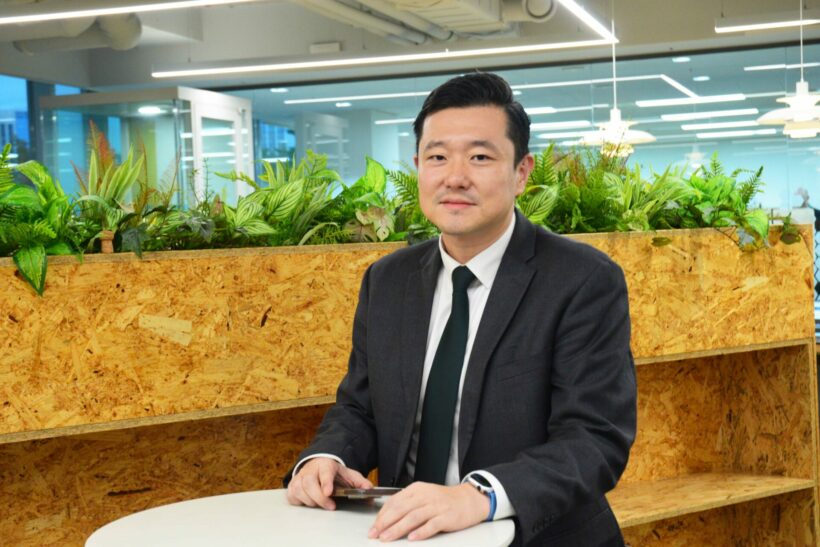 Juhern Kim, GGGI’s Country Representative in Vietnam.
Juhern Kim, GGGI’s Country Representative in Vietnam.
Juhern Kim, GGGI’s Country Representative in Vietnam, spoke about Greenpreneurs, an initiative he has led since its inception in 2018. Greenpreneurs is GGGI’s flagship program supporting startups focused on climate solutions. Over the past five years, Kim has worked to provide incubation and acceleration services for early-stage companies tackling critical environmental issues.
“Greenpreneurs is a platform dedicated to empowering startups and entrepreneurs working on climate challenges,” Kim explained. “We help them scale by providing the tools and resources needed to bring their innovations to market. My current focus – let say Greenpreneurs 2.0 approach – is on climate technology initiatives, especially in countries with high emissions potential, like those in Southeast Asia.”
He emphasized that nations such as Indonesia, Vietnam, and the Philippines, where manufacturing and offshore businesses are growing, need these technologies to meet their net-zero commitments. “These countries are experiencing increasing emissions, while at the same time, they are committed to net-zero supply chains. Climate technologies are crucial to bridging this gap.”
Kim pointed to projections from the International Energy Agency (IEA) for 2050, which expect that currently available climate technologies can address only 30-35% of the emissions reduction needed for net zero by 2050. “The remaining 70% of the required emissions reduction will depend on technologies that are still in early adoption, prototype, or demonstration stages. Startups, entrepreneurs, and venture capital/impact funds will play a critical role in advancing these technologies, making them more mature, tested, and ready for commercialization.”
Kim also touched on the exciting potential of artificial intelligence (AI) in climate tech – especially in the context of emerging and developing countries, noting that AI applications are beginning to make their mark. For example, AI software can optimize electricity usage in buildings for charging electric vehicles (EVs) and prevent fires in low-quality distribution lines in emerging economies with infrastructure constraints. Another promising area is AI-powered detection of alternate-wetting and drying (AWD) techniques in rice fields, which can generate carbon credits.
“These emerging climate technologies are essential for driving the transition to a more sustainable future,” Kim said. “And they’re coming at the right time, as we urgently need innovation to tackle our most pressing climate challenges.”
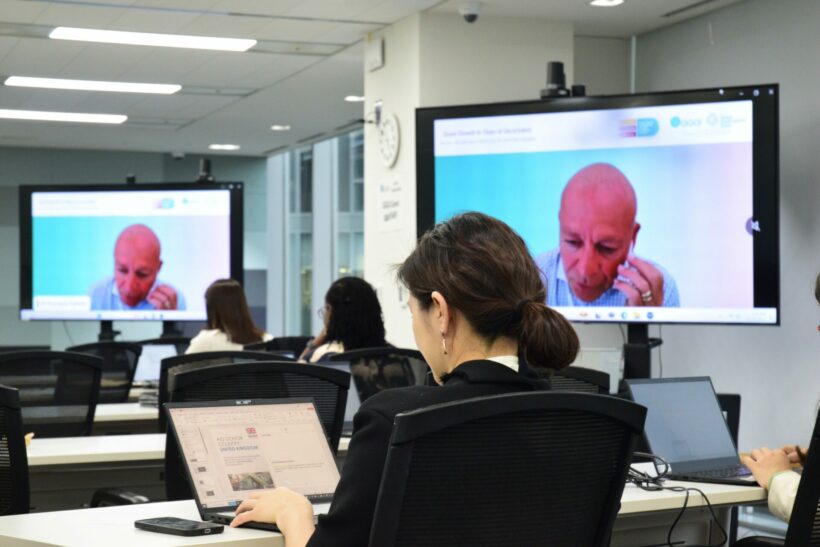
The hybrid conference will continue discussing green growth until this week, 18 October, in Seoul and
on 22 October 2004, in Cali City, Colombia.
For further information please visit www.gggi.org
Photos by Bereket Alemayeehu, taken 14 October


